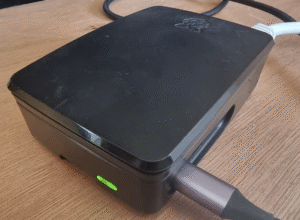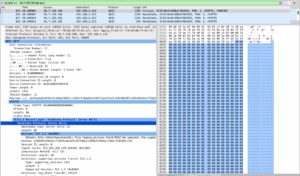בפוסט הקודם יצרתי עציץ תבוני שיכול לדבר וכתבתי בסוף שיש בעיה עם רספברי פיי וחיישנים אנלוגיים, ובכלל – רספברי פיי הוא כבד וחזק אבל בגדול מה שאנחנו צריכים לשלוח מהעציץ התבוני שלנו זה מידע אנלוגי ואפשר לעשות את זה עם מיקרו בקר מסוג esp32. במקרה הזה אפשר גם לשים כמה בקרים בכמה עציצים ולהפוך את כל הסלון לתבוני. הרספברי פיי יהיה המחשב שמריץ את הכל, אבל הטריגרים יהיו המיקרו בקרים.
יש כמובן עוד לא מעט תרחישים שבהם תקשורת כזו תהיה שימושית. בגדול – אין שום מניעה לפתוח API גם ברספברי וגם ב-ESP32 ולתקשר ב-REST. אבל ב-IoT מקובל להשתמש בפרוטוקול שנקרא MQTT – ראשי תבות של Message Queuing Telemetry Transport. יש לו תמיכה מעולה ברספברי פיי ובמיקרופייתון ובאמת כדאי להכיר.
הידע הנדרש להבנת פוסט זה הוא ידע מספק להתחברות אל רספברי פיי (אפשר להתחיל עם המדריך להתחברות מרחוק לרספברי פיי) וידע בסיסי ב-esp32 (אפשר לקרוא את הפוסט על חיבור ל esp32).
מה זה MQTT?
בגדול MQTT הוא pub\sub. כלומר יש לי ברוקר (שאותו אני מתקין על הרספברי פיי) והוא זה שמקבל הודעות. מתכנתי ווב? זה עובד באופן זהה לקפקא שגם אותו אפשר להתקין אם ממש רוצים על רספברי פיי. רגע, לא להכנס ללחץ!
איך pub\sub עובד? יש שרת מרכזי שאליו אפשר להרשם כדי לקבל הודעות (רק צריך לפרט את סוג ההודעות) ואליו אפשר גם לשלוח הודעות (רק צריך לציין את סוג ההודעה ששולחים). באמת הכי פשוט בעולם. אני למשל שולח הודעה בסוג ״ahla" ורק מי שמאזין לסוג ההודעות ahla יקבל את ההודעה שלי – התוכן כמובן תלוי בי. כאשר יכולים להיות כמה מאזינים לאותה הודעה. במקרה שלנו, אנחנו רוצים אפשרות שכמה יוכלו לשלוח הודעות לרספברי פיי – וזה מתאים בדיוק למה שאנחנו צריכים.
התקנה של הברוקר והקליינט על רספברי פיי
אז אנחנו נתקין על רספברי פיי שתי תוכנות – התוכנה הראשונה היא המוח – הברוקר – זה שהתפקיד שלו הוא לקבל את כל ההודעות שנשלחות לפרסום ולשלוח אותם רק לאלו שמאזינים לנושא הזה.
התוכנה השניה היא זו שמאזינה להודעות ויכולה לשלוח הודעות ואת שתיהן נתקין כמובן על הרספברי פיי, שיישא בנטל של הברוקר.
אני בחרתי ב-Mosquitto שהיא קלה מאד להפעלה ולהתקנה ומשמשת לכל הפעולות.
את התוכנות נתקין כך:
sudo apt install -y mosquitto mosquitto-clientsנמתין לסיום ההתקנה ואז נבקש מהרספברי פיי להעלות את מוסקיטו תמיד בכל העלאה:
sudo systemctl enable mosquitto.serviceהשלב הבא הוא לבדוק שהכל תקין עם:
mosquitto -vאם יש תקלה מסוג: Error: Address already in use – לא להבהל. יש להרוג את התהליך של mosquitto ואז להפעיל שוב.
ps -ef | grep mosquitto
# Choosing mosquitto_pid
sudo kill mosquitto_pidוכך זה נראה אצלי:

ואז mosquitto -v יעבוד.
עכשיו נכנס להגדרות. נכתוב:
sudo nano /etc/mosquitto/mosquitto.confנכניס שתי שורות בתחתית הקובץ – בגדול אנו מגדירים בהן שאנו מאזינים לפורט מסוים ואנו לא משתמשים באימות משתמשים (כרגע).
listener 1883
allow_anonymous trueנאתחל את השירות באמצעות:
sudo systemctl restart mosquittoזהו! זה השלב הקשה. עכשיו בואו ונבדוק את העניין. נפתח שני חלונות ב-shell. אחד יאזין והשני ישדר. זה קצת מטופש, אבל יאפשר לנו לבדוק שהכל עובד. כמו לחייג לעצמך.
בחלון הראשון נקליד
mosquitto_sub -d -t testTopic
אנו נראה שמתחיל לרוץ לאיטו לוג. זה הלוג שמאזין לכל ההודעות שהנושא שלהן הוא testTopic. אין כרגע אירועים.
בחלון השני נשלח אירוע! איך? עם הפקודה:
mosquitto_pub -d -t testTopic -m "Hello world!"אם נעבור לחלון השני, נראה את ה-Hello world! אם נחזור ונשדר, אולי עם טקסט אחר כמו wassap אז נראה גם את ההודעה הזו.


הכל עובד? מעולה! עכשיו זה השלב של ה-esp32!
התקנת MQTT על ESP32
ניגש אל ה-esp32 ונצרוב קושחה חדשה.
אנו ניצור קובץ חדש בשם umqttsimple.py ונכניס אליו את התוכן הבא (מקור), זה בעצם ה״דרייבר״ שבאמצעותו מתחברים:
import socket
import struct
from binascii import hexlify
class MQTTException(Exception):
pass
class MQTTClient:
def __init__(
self,
client_id,
server,
port=0,
user=None,
password=None,
keepalive=0,
ssl=None,
):
if port == 0:
port = 8883 if ssl else 1883
self.client_id = client_id
self.sock = None
self.server = server
self.port = port
self.ssl = ssl
self.pid = 0
self.cb = None
self.user = user
self.pswd = password
self.keepalive = keepalive
self.lw_topic = None
self.lw_msg = None
self.lw_qos = 0
self.lw_retain = False
def _send_str(self, s):
self.sock.write(struct.pack("!H", len(s)))
self.sock.write(s)
def _recv_len(self):
n = 0
sh = 0
while 1:
b = self.sock.read(1)[0]
n |= (b & 0x7F) << sh
if not b & 0x80:
return n
sh += 7
def set_callback(self, f):
self.cb = f
def set_last_will(self, topic, msg, retain=False, qos=0):
assert 0 <= qos <= 2
assert topic
self.lw_topic = topic
self.lw_msg = msg
self.lw_qos = qos
self.lw_retain = retain
def connect(self, clean_session=True):
self.sock = socket.socket()
addr = socket.getaddrinfo(self.server, self.port)[0][-1]
self.sock.connect(addr)
if self.ssl:
self.sock = self.ssl.wrap_socket(self.sock, server_hostname=self.server)
premsg = bytearray(b"\x10\0\0\0\0\0")
msg = bytearray(b"\x04MQTT\x04\x02\0\0")
sz = 10 + 2 + len(self.client_id)
msg[6] = clean_session << 1
if self.user:
sz += 2 + len(self.user) + 2 + len(self.pswd)
msg[6] |= 0xC0
if self.keepalive:
assert self.keepalive < 65536
msg[7] |= self.keepalive >> 8
msg[8] |= self.keepalive & 0x00FF
if self.lw_topic:
sz += 2 + len(self.lw_topic) + 2 + len(self.lw_msg)
msg[6] |= 0x4 | (self.lw_qos & 0x1) << 3 | (self.lw_qos & 0x2) << 3
msg[6] |= self.lw_retain << 5
i = 1
while sz > 0x7F:
premsg[i] = (sz & 0x7F) | 0x80
sz >>= 7
i += 1
premsg[i] = sz
self.sock.write(premsg, i + 2)
self.sock.write(msg)
# print(hex(len(msg)), hexlify(msg, ":"))
self._send_str(self.client_id)
if self.lw_topic:
self._send_str(self.lw_topic)
self._send_str(self.lw_msg)
if self.user:
self._send_str(self.user)
self._send_str(self.pswd)
resp = self.sock.read(4)
assert resp[0] == 0x20 and resp[1] == 0x02
if resp[3] != 0:
raise MQTTException(resp[3])
return resp[2] & 1
def disconnect(self):
self.sock.write(b"\xe0\0")
self.sock.close()
def ping(self):
self.sock.write(b"\xc0\0")
def publish(self, topic, msg, retain=False, qos=0):
pkt = bytearray(b"\x30\0\0\0")
pkt[0] |= qos << 1 | retain
sz = 2 + len(topic) + len(msg)
if qos > 0:
sz += 2
assert sz < 2097152
i = 1
while sz > 0x7F:
pkt[i] = (sz & 0x7F) | 0x80
sz >>= 7
i += 1
pkt[i] = sz
# print(hex(len(pkt)), hexlify(pkt, ":"))
self.sock.write(pkt, i + 1)
self._send_str(topic)
if qos > 0:
self.pid += 1
pid = self.pid
struct.pack_into("!H", pkt, 0, pid)
self.sock.write(pkt, 2)
self.sock.write(msg)
if qos == 1:
while 1:
op = self.wait_msg()
if op == 0x40:
sz = self.sock.read(1)
assert sz == b"\x02"
rcv_pid = self.sock.read(2)
rcv_pid = rcv_pid[0] << 8 | rcv_pid[1]
if pid == rcv_pid:
return
elif qos == 2:
assert 0
def subscribe(self, topic, qos=0):
assert self.cb is not None, "Subscribe callback is not set"
pkt = bytearray(b"\x82\0\0\0")
self.pid += 1
struct.pack_into("!BH", pkt, 1, 2 + 2 + len(topic) + 1, self.pid)
# print(hex(len(pkt)), hexlify(pkt, ":"))
self.sock.write(pkt)
self._send_str(topic)
self.sock.write(qos.to_bytes(1, "little"))
while 1:
op = self.wait_msg()
if op == 0x90:
resp = self.sock.read(4)
# print(resp)
assert resp[1] == pkt[2] and resp[2] == pkt[3]
if resp[3] == 0x80:
raise MQTTException(resp[3])
return
# Wait for a single incoming MQTT message and process it.
# Subscribed messages are delivered to a callback previously
# set by .set_callback() method. Other (internal) MQTT
# messages processed internally.
def wait_msg(self):
res = self.sock.read(1)
self.sock.setblocking(True)
if res is None:
return None
if res == b"":
raise OSError(-1)
if res == b"\xd0": # PINGRESP
sz = self.sock.read(1)[0]
assert sz == 0
return None
op = res[0]
if op & 0xF0 != 0x30:
return op
sz = self._recv_len()
topic_len = self.sock.read(2)
topic_len = (topic_len[0] << 8) | topic_len[1]
topic = self.sock.read(topic_len)
sz -= topic_len + 2
if op & 6:
pid = self.sock.read(2)
pid = pid[0] << 8 | pid[1]
sz -= 2
msg = self.sock.read(sz)
self.cb(topic, msg)
if op & 6 == 2:
pkt = bytearray(b"\x40\x02\0\0")
struct.pack_into("!H", pkt, 2, pid)
self.sock.write(pkt)
elif op & 6 == 4:
assert 0
return op
# Checks whether a pending message from server is available.
# If not, returns immediately with None. Otherwise, does
# the same processing as wait_msg.
def check_msg(self):
self.sock.setblocking(False)
return self.wait_msg()השלב הבא הוא ללכת ל boot.py שכבר קיים ולהכניס לשם קוד שעושה כמה דברים – הראשון הוא להכריז על כתובת ה-IP של השרת שלנו, שאותה מצאנו קודם. אנחנו צריכים הרי לדעת לאן להתחבר. השניה היא להתחבר ל-wifi 🙂
החליפו בקוד הזה את YOUR_MQTT_SERVER_IP ב-IP של הרספברי פיי, את ה-YOUR_SSID בשם של הרשת שלכם ואת YOUR_PASSWORD בסיסמה של הרשת שלכם. שימרו את הקובץ. אפשר גם להריץ אותו כדי לוודא חיבור.
# This file is executed on every boot (including wake-boot from deepsleep)
#import esp
#esp.osdebug(None)
#import webrepl
#webrepl.start()
import time
from umqttsimple import MQTTClient
import ubinascii
import machine
import micropython
import network
import esp
esp.osdebug(None)
import gc
gc.collect()
mqtt_server = 'YOUR_MQTT_SERVER_IP'
client_id = ubinascii.hexlify(machine.unique_id())
topic_sub = b'from_mothership'
topic_pub = b'to_mothership'
last_message = 0
message_interval = 5
counter = 0
wlan = network.WLAN(network.STA_IF)
wlan.active(True)
# might already be connected somehow.
if wlan.isconnected() == False:
wlan.connect("YOUR_SSID", "YOUR_PASSWORD")
# Wait for connection.
while wlan.isconnected() == False:
pass
print('connected!');
print(wlan.ifconfig())
השלב הבא והאחרון הוא ליצור קובץ בשם main.py ונכניס בו את הקוד הזה:
# Complete project details at https://RandomNerdTutorials.com
def sub_cb(topic, msg):
print((topic, msg))
if topic == b'from_mothership' and msg == b'received':
print('ESP received notification from mothership!')
def connect_and_subscribe():
global client_id, mqtt_server, topic_sub
client = MQTTClient(client_id, mqtt_server)
client.set_callback(sub_cb)
client.connect()
client.subscribe(topic_sub)
print('Connected to %s MQTT broker, subscribed to %s topic' % (mqtt_server, topic_sub))
return client
def restart_and_reconnect():
print('Failed to connect to MQTT broker. Reconnecting...')
time.sleep(10)
machine.reset()
try:
client = connect_and_subscribe()
except OSError as e:
restart_and_reconnect()
while True:
try:
client.check_msg()
if (time.time() - last_message) > message_interval:
msg = b'Test to mothership #%d' % counter
client.publish(topic_pub, msg)
last_message = time.time()
counter += 1
except OSError as e:
restart_and_reconnect()
מה שאני יוצר פה זה קוד שמאזין לנושא from_mothership וגם קוד ששולח הודעות כל 5 שניות לנושא to_mothership. הקונטקסט ברור – אני מאזין לכל מה שמגיע מספינת האם (הרספברי פיי) ושולח הודעות למה שהרספברי פיי מאזין לו.
הבדיקה: שידור מרספברי אל ESP32 ומ-ESP32 אל הרספברי
עכשיו הבדיקה הגדולה! אני אחזור חזרה אל הרספברי פיי ואקליד:
mosquitto_pub -d -t from_mothership -m "wassap!"אם הכל כשורה – אני אראה את הטקסט בלוג של טוני!

השלב הבא הוא ללכת לחלון השני של הרספברי פיי ולהאזין ל "to_mothership״ באמצעות הקוד הזה:
mosquitto_sub -d -t to_mothershipאם הכל כשורה – אני אראה שידור כל 5 שניות אל ספינת האם! מה-esp32 אל הרספברי פיי!

וזו הנקודה שאפשר קצת להשען אחורה ולהנות. יש כמובן עוד המון מה ללמוד בנושא, אבל בשביל מטרות פשוטות הידע הזה י��פיק. בפוסט הבא נראה איך באמצעות פייתון אפשר לקבל מידע ממיקרו בקר ואז לבצע הפעלה ברספברי פיי.







2 תגובות
למה הקוד חוזר על עצמו 6 פעמים
הכוונה זה לקוד שעל הesp32